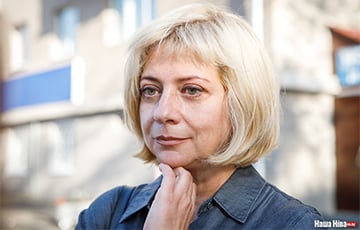Generals With Bungling Careers
8- IRYNA KHALIP
- 15.04.2022, 13:00
- 45,960

PHOTO: NASHA NIVA
Just look at their commander-in-chief and everything will become clear.
I don't understand where the bewilderment about actions of Russian military in Ukraine comes from. I don't understand the phrases "this is beyond good and evil!", "how could they!", "is a person capable of such a thing?" I don't understand what could be surprising here.
In my opinion, everything they do is quite logical and natural. The main value in the Russian army has always been subordination, not fighting ability. So the lower ranks are a pale imitation of the middle ones, and the middle ones, in turn, are the same imitation of the higher ranks. Therefore it is enough to look at the Russian generals in order to understand the Russian soldiers.
Take, for example, Colonel General Shamanov, who categorically denies that the military, who occupied the Chernobyl nuclear power plant and were digging trenches in the Red Forest, might be affected by radiation. Shamanov says: no, they could not have received a radiation dose because "our partisans occupied these positions during the Great Patriotic War and none of them got radiation disease". And these are not the words of a warrant officer, but those of a combat general, commander, deputy. The army commander, who once had married off his daughter well to mob kingpin Glyba and then sent two groups of Special Forces to intercept a Moscow investigator, who was on his way to Glyba's home to conduct a search. The combat general, who banned civilians from leaving the war zone in Chechnya in 1999, waited until thousands of refugees piled up at a closed checkpoint and gave the order for an air raid. The deputy who said: "We don't need visas, we need an order from the commander-in-chief". So, does anybody else have questions about those degenerates who went to entrench themselves in the Red Forest, about those who are taking out everything to the last nail from the ruined houses and about those who are bombing the civilians? Look at the generals and everything will become clear.
For me personally, the most typical personage among Russian generals is commander of Russian air-space forces Sergey Surovikin. It would be impossible to invent such a biography on purpose. In 1991, during the August putsch, Captain Surovikin was the battalion commander of the 2nd Guards Motorized Rifle Division. And it was on his order that Dmitry Komar was run down by a BMP, and Ilya Krichevsky and Vladimir Usov were shot dead. Shortly after the failure of the GKChP, Surovikin was arrested and sent to Lefortovo. But seven months later he was released without trial, promoted to the rank of major and even sent to the Frunze Academy. Apparently, Boris Yeltsin decided that 'he needed such a cow himself'. By the way, apart from the murderer-Surovikin, on that Moscow square, there was also a hero - Major Yevdokimov, whose tankers sided with the people. But after the putsch, hero Yevdokimov was immediately transferred to the provincial military registration and enlistment office, and then - to retirement.
It was probably then that all Russian soldiers understood that to defend the people is the way to the losers and that to carry out criminal orders is a straight path to the general's pompas and the marshal's batons. Surovikin understood that as well. During his studies at the academy, the gun left at the scene of one contract killing led straight to the major. But Surovikin, when they came for him, merely shrugged his shoulders and said he had lost the gun. Do you think he went to prison after that? No, and he wasn't even expelled from the academy. "Such a cow..." - you know.
In 2004, his deputy colonel Shtakal shot himself in the office of Surovikin - then the commander. Moreover, in his presence. He shrugged his shoulders again - no big deal. Shot himself in the temple - and that's all right. And indeed, no investigation, no military prosecutors, no disciplinary punishments, nothing. Only another rank and reward. There was also a beating of a subordinate in the same year, but no one paid any attention to that at all. Last year, three days before the thirtieth anniversary of the August coup d'etat, Surovikin, who had killed three young Russians in that putsch, was promoted to the rank of army general. Now he commands the aerospace forces, and it is by his orders that the Ukrainian cities are bombed. Here it is, the crown of his career. The marshal's baton is already somewhere within reach.
So there is nothing illogical about the bastard antics of the Russian military in Ukraine. The officers are the same as the generals. The soldiers are the same as the officers. How can the people commanded by Surovikins be sane? There are only degenerates.
On second thoughts, why am I finding fault with the generals, and why am I making up such a long chain? It could have been simpler: one only has to look at their commander-in-chief, and everything becomes clear.
Iryna Khalip, specially for Charter97.org











